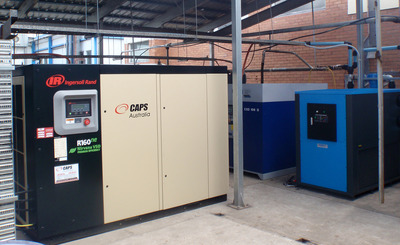CAPS compresses Kilcoy’s costs
Tuesday, 30 July, 2013
The Kilcoy Pastoral Company’s facilities in Queensland have drastically reduced energy expenditure by refurbishing existing plant and installing new compressor equipment supplied by Compressed Air and Power Solutions Australia (CAPS).
Kilcoy was formed in 1953 to supply local butchers, and since that time it has grown to be one of the largest integrated beef processors in Australia. Each year, more than 260,000 head of cattle pass through the company’s facility 100 km north-west of Brisbane.
Kilcoy sells meat to the domestic Australian market and also supplies its processed beef to 20 international markets, through its accreditation with AUS-MEAT as an approved exporter. The company is a major employer in the region of South-East Queensland around the town which gave the company its name.
An air of efficiency
In 2011, a full energy audit of the Kilcoy plant was conducted by Energy Efficiency Services (EES), a business division of CAPS Australia. Compressed air is responsible for 10-15% of industrial electricity use nationwide. The audit results indicated there were considerable savings to be made by ensuring the compressed air systems were energy efficient.
According to John Pears, Queensland Sales Engineer for CAPS, an Ingersoll Rand Nirvana R160ne-A compressor was selected to achieve this objective. The system supplies the compressed air for the meat processors, pumps and tools, in addition to the packaging lines.

The compressor features a variable speed drive (VSD) coupled with an intuitive controller with easily adjustable operating parameters, onboard diagnostics and a built-in energy savings calculator. The unit also utilises a coolant curtain to reduce energy consumption by injecting atomised oil into the compressed air stream, significantly lowering the energy required for compression. If maintenance is required, the product features removable hinged doors that allow easy access to internal components.
The Ingersoll Rand premium efficiency packages that are supplied with the compressor allow users to utilise the full potential of VSD compressors through the use of two-stage airends. These deliver up to 15% more air than a single-stage compressor while consuming the same amount of energy. Models in the Nirvana range are supplied with the Hybrid Permanent Magnet (HPM) motor which provides reliability and efficiency with unlimited starts/stops and constant pressure control. The compressor also has a ‘soft start’ facility that allows the compressor to conserve energy by shutting down instead of running unloaded.
To reduce downtime and lost production, the product is rated for continuous operation 24 hours/day, seven days/week at 100% loading. It is effective in high ambient temperatures of up to 46°C, so it’s suitable for some of Australia’s harshest environments.
Clean air
Kilcoy Chief Executive Dean Goode explained that the air compressor upgrade was part of the processor’s ongoing program to improve its performance and reduce plant carbon emissions. The commissioning of new compressors, along with the installation of new refrigerated dryer and additional filtration systems, was the largest contributing factor in the company’s energy cost savings.
“Even though the average plant compressed air usage has increased by about 14%, there has been an average power reduction of 15% due to the improved compressor technology utilised,” Goode said.
“We’re proud of our reputation and have worked hard to improve our sustainability. This upgrade is part of a continuing series of improvements aimed at delivering world-class environmental operations.”
Quentin St Baker, National Manager of EES, said the Kilcoy upgrade not only substantially boosts performance, but will also help to improve equipment life span and eliminate production downtime. He estimated that the resulting air compressor energy savings would exceed 40% and maintenance costs would be reduced by approximately 30%.
Kilcoy secured funding via a federal government Low Carbon Grant arranged through Origin Energy. St Baker explained, “Low Carbon Australia’s finance covered the upfront costs of upgrading equipment, which meant that our client could start benefiting from resulting energy efficiencies sooner.”
Goode said the energy savings from the compressed air upgrade would probably recoup the company’s investment within four years.
Fluoride boosts water-processed perovskite solar cells
Queensland University of Technology has developed a water processing method to fabricate more...
Multibuild solar installation delivered at City of Playford
Trinasolar partnered with Venergy Solar to deliver a multibuild solar installation across the...
Oracle assists major distributor in clean energy transition
Essential Energy, an electricity distributor in Australia, is said to have modernised its...










